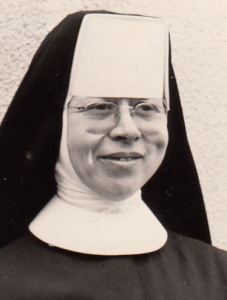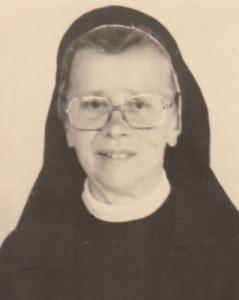 Maria Elisabeth Caspar was born on July 7th 1918 in Berschweiler, diocese of Trier, Germany. She was called Liesel, a short form of her name Elisabeth. Later, in Peru, she was called Isabel – the Spanish form of her name.
Maria Elisabeth Caspar was born on July 7th 1918 in Berschweiler, diocese of Trier, Germany. She was called Liesel, a short form of her name Elisabeth. Later, in Peru, she was called Isabel – the Spanish form of her name.
Until 1930 she attended the local Elementary School and then, for four years, the Grammar School in Saarlouis. Liesel grew up in a deeply religious family. Her own sister was also a Pallottine Missionary Sister of the English Province. Her father, an upright and loyal catholic and headmaster of a school, underwent considerable suffering during the Nazi period.
Liesel felt drawn to missionary life early on. In 1934 she joined the mission school of the Pallottine Sisters in Limburg, and shortly afterwards was sent to the Convent High School, Rochdale, England. She passed her London Matriculation Exam in 1938 and, on October 20th of the same year began her postulancy in Limburg, Germany. On August 16th 1939 she became a novice. She took her first vows on August 17th 1941 and her final ones on August 15th 1947.
Like so many young professed Sisters at the time, she had to help nurse the sick in the hospital that had been established in the mission house of the Pallottines in Limburg. Here she obtained her Nursing Certificate in 1945. After its closure in 1947 Sr Liesel helped in the office of the Sisters’ motherhouse Marienborn, until she joined the staff of their children’s home in Facit, England. When in 1952 staff and children moved to Pallotti Hall, she was transferred there.
In 1956 Sr Liesel returned to Limburg, Germany and soon afterwards was sent to the mission in British Honduras, now Belize. At the time her health deteriorated and in 1963 she had to return to Limburg. A few years later she returned to England.
During her time in England Sr Liesel was able and willing to turn her hand to various ministries. The Pallottines remember her with fondness, for she helped in their college in Thurles, Ireland, and in the Provincial House in Golders Green, London. She was also one of the pioneers who helped get the Westminster Pastoral Centre at London Colney into some form of habitable state.
One of her happiest periods was the time spent in the mission field of Peru. In 1977 she willingly agreed to help a missionary team from the Diocese of Leeds. One of the Sisters of Mercy who worked there fell ill and Sr Liesel “temporarily” took her place. On 23rd of December she arrived in Huambo in the Diocese of Chachapoyas in the Amazonas region.
At first Sr Liesel worked in this isolated and poor area in the Andes. She writes of the village: “It could be a replica of Nazareth or Bethlehem with its living quarters and children, donkeys and horses, with its rough streets and insanitary conditions.” Of her first Christmas in Peru she says: “Christmas is everywhere, also in Huambo. Tonight I shall experience it quite differently. He became poor for the poor, and lived with the poor. It makes me very happy to share some of that poverty with Him in order to help these people find happiness in Him. They are all Catholics of a sort, but full of ignorance and superstitions, helpless and hopeless, because they can’t believe that they can improve things with God’s help and their own efforts. Yet they are friendly, open and affectionate and welcomed me like a miracle. May I not disappoint them.”
She worked very hard in Huambo. Often they had to ride out on donkeys or horses to reach isolated areas where the sick and lonely were waiting for Holy Communion, where children had to be baptised and where the poor waited for comfort. From the beginning she was much involved with catechesis and the formation of catechists. After some years she moved to the episcopal town of Chachapoyas.
 When the team dispersed in 1987, Sr Liesel and Fr Gerry Hanlon, a priest of this missionary team of the Diocese of Leeds, moved into the Cathedral Town of the Apostolic Vicariate of Iquitos. Here Sr Liesel took care of passing missionaries, continued catechesis and preparation of liturgies, was spiritual director of the Legion of Mary, and above all became absorbed with work for street children and drug addicts. Just before her death she had begun begging for money to foster a fishing project, which would enable a number of fathers to make a living for their families. God alone knows the many efforts she made for the poor of the town.
When the team dispersed in 1987, Sr Liesel and Fr Gerry Hanlon, a priest of this missionary team of the Diocese of Leeds, moved into the Cathedral Town of the Apostolic Vicariate of Iquitos. Here Sr Liesel took care of passing missionaries, continued catechesis and preparation of liturgies, was spiritual director of the Legion of Mary, and above all became absorbed with work for street children and drug addicts. Just before her death she had begun begging for money to foster a fishing project, which would enable a number of fathers to make a living for their families. God alone knows the many efforts she made for the poor of the town.
In November 1996, Sr Liesel suffered from a severe pulmonary illness aggravated by embolism. She rallied but still needed medical supervision. In January 1998 she wrote: “I feel well and strong. I take my weekly day off to go into the country and I take it easy.” In the same letter she wrote: “The next big event will be the General Chapter starting in March.” She followed closely the events of her Province and of the Congregation.
Unexpected by the Sisters of her Congregation, she died on 14th April 1998 in Iquitos, where she was buried.
Christine Bohr sac – London – ENGLAND
05.10.15
Fr Gerry Hanlon, on whose invitation Sr Liesel had gone to Peru and with whom she worked most of her time there, remembers her nearly seventeen years later:
Sr Liesel arrived in Huambo, our extremely remote village, on the top of an open truck on Christmas eve 1977.
When I was appointed to Chachapoyas she followed me there and became diocesan bursar, making sure the priests and sisters who came in from their remote parishes, got enough money to live on.
Then, when I moved to Iquitos in the jungle area, she followed me there. We lived in a mission house and said morning prayer together before having her special breakfast. I was involved in education, and she attended Legion of Mary meetings, and monitored all the Masses at the Cathedral. She also bought food and took it out into to the country every Saturday to a drug addiction rehabilitation house.
Needless to say I greatly enjoyed her company and she was extremely kind to me.
Thousands turned out for her funeral, and it was most moving to see ex drug addicts carry her coffin. Their comment was “She was a mother to us all”.
This comment courtesy Sr Adelheid Scheloske sac, archivist for the Pallottine Missionary Sisters, Germany
